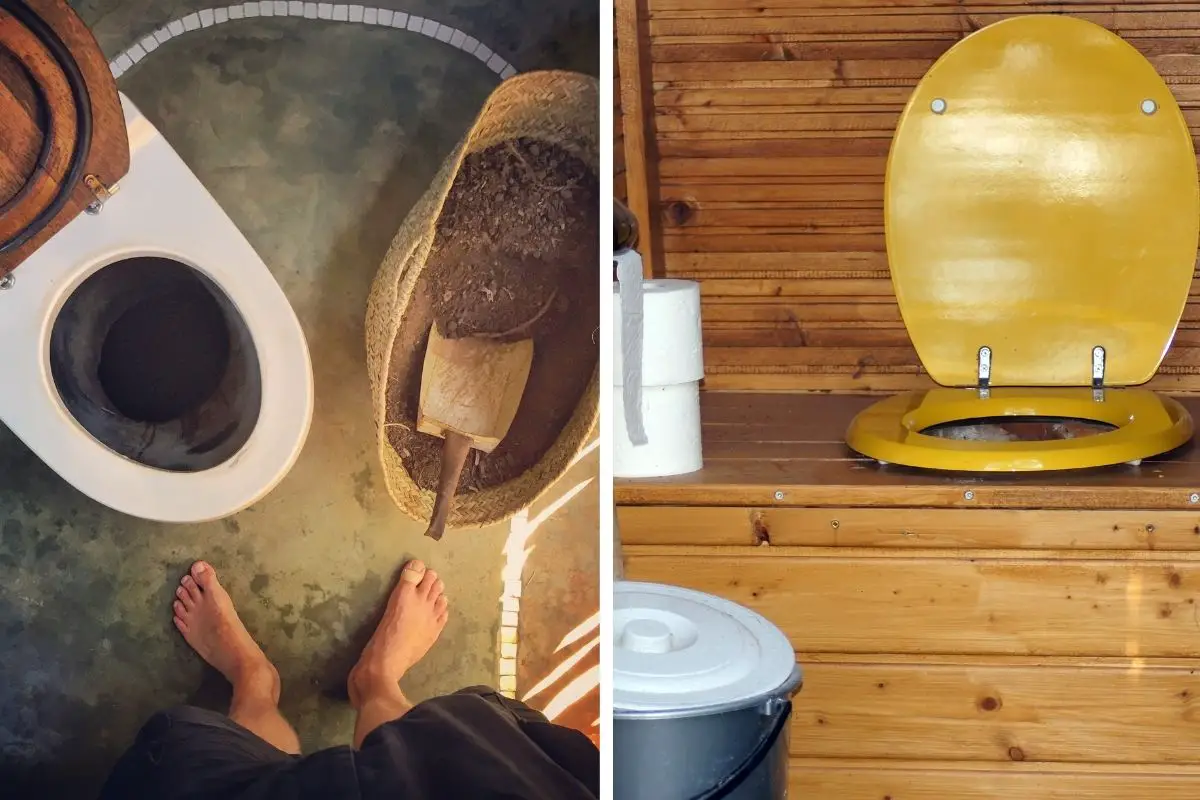Composting Toilet vs Septic Tank: Which Should You Choose?
I have big dreams of living sustainably and self-sufficiently, but then I wonder how I go without the typical comforts of every day life! That includes the toilet!
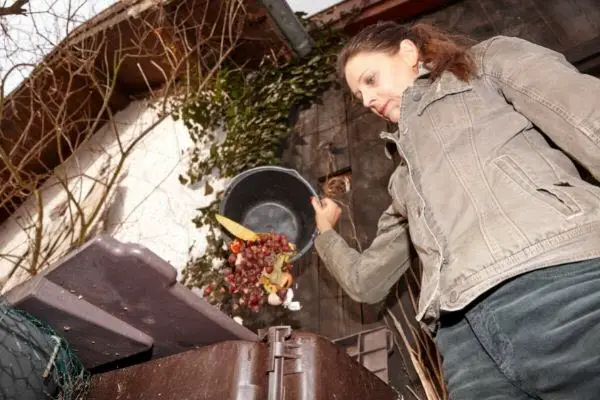
First of all, composting toilets and septic tanks essentially function to store and decompose human waste in a contained environment. They are both viable alternatives to paying for the installation of sewer systems for those living in rural areas. These toilets do require more maintenance than a conventional toilet, however, they offer a great opportunity.
Compost toilets and septic systems are more eco-friendly and save you a great deal of money. Laying a sewage line can cost a huge amount and often leads to much higher levels of water being wasted.
So what is better, a composting toilet or a septic container? Well, the short answer is, it depends.
The compost toilet is cheaper but requires more regular maintenance. On the other hand, installing a septic system can be expensive but the upkeep is less demanding.
What is a Composting Toilet?
Unlike a septic system, compost toilets DO NOT require water sources to dispose of waste. It is a dry toilet that encourages decomposition by millions of microbes. This is done by creating an oxygen-rich atmosphere that allows microbes to thrive and break down human waste products.
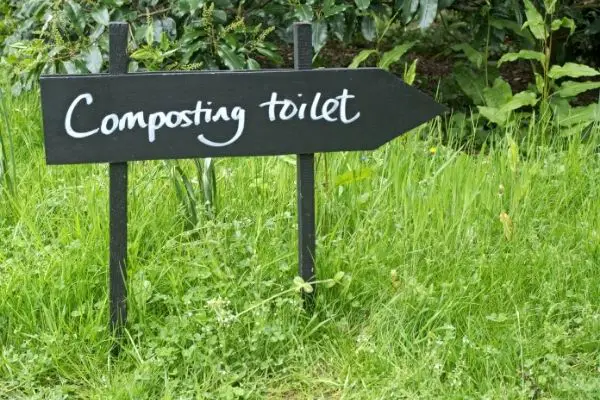
These self-contained compost toilets offer a fantastic opportunity to produce your own fertile soil from the compost pile. This is perfect for growing plants and even food in your very own backyard. So if you want to grow your own fresh produce, this is a great way to do so!
The main disadvantage of composting toilets is that the chamber that contains the waste needs to be emptied every 2-3 months. This is slightly more work than the other options, however, the benefit is clear. It is a much more eco-friendly option that allows you to save money without the build-up of wastewater.
What is a Septic Tank?
A septic system essentially works by treating sewage and wastewater onsite instead of through a sewage line. They are an ideal alternative for those living in rural areas. Although the plumbing cost of installing the tank is fairly substantial, it is still much cheaper than connecting your rural house to the main sewer line.
Once installed, the sewage container can last a very long time. On average the lifespan is around 30-50 years so it is thought of as a worthy investment. As opposed to composting systems, this type of sewage disposal DOES require water.

This makes it less eco-friendly, however, it is still a much cleaner option than regular disposal. This is because the treatment process filters the sewage sludge that enriches nearby soil. The water used is also recycled, meaning the overall water wasted is lower than normal systems.
The main disadvantage with this type of system is the upkeep that comes with it. It is your responsibility to monitor the self-contained system so that it will work properly. Problems can happen which may lead to a number of issues including leakages and bad odor.
Composting Toilets vs Flush Toilets
The two main types of toilets available are composting toilets and your traditional flush toilets. Flush toilets include those connected to the main sewer line or a septic container. Both look just like normal toilets with a toilet seat and all.
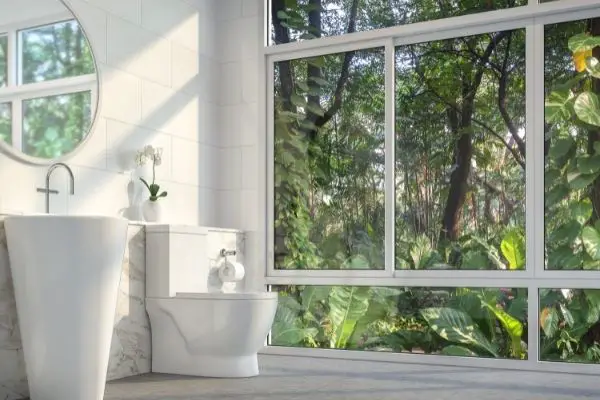
The main difference between these two is that the flush toilet requires water to dispose of waste. There are a couple of other distinctions to be made so we have compiled a list of talking points below.
Note: costs/prices quoted in this article are all as of writing and may change anytime depending on various circumstances.
Price Point
First of all, how do the prices differ? The cost of a self-contained composting toilet starts at around $1,400. This may sound somewhat steep, however, when compared with the expense of installing a septic container this is low-cost.
The price of a septic container alone ranges from $1,100 to $2,000, not including the price to install, which we will get to.
For a flush toilet that is connected to the main sewer line, there are also hidden costs. The water used for flushing will be included in the water and electricity bill. This will include rates for sewage management and treatment.
Installation and Maintenance
The cost to install a septic container, including plumbing, ranges from $2700-$5500. The cost to install a composting toilet starts at around $800. However once installed, the septic container requires a lot less maintenance when compared to the composting toilet.
Environment
Without a doubt, composting toilets are the most eco-friendly option. Toilets that flush use up water resources that require chemical cleaning before they can be released. Even with septic systems that use much less water, the composting toilet comes out on top.
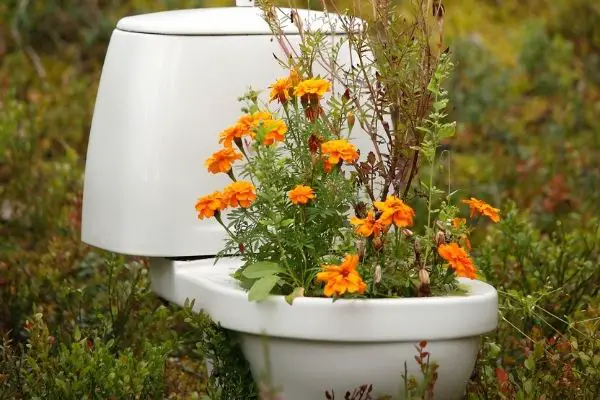
Another question you may have is, can I put toilet paper in a composting toilet? The answer is YES – toilet paper will eventually degrade and be broken down.
Cleaning
This is perhaps the only time where composting toilets do not come out ahead. A composting toilet requires slightly more work than your average flush toilet.
It needs to be emptied once every 2-3 months whereas your regular toilet will not need emptying at all. The septic toilet will need to be pumped every 3-5 years but this is fairly easily done with the hiring of a pumper truck.
Final Thoughts
For those looking to be super eco-friendly conscious, the composting toilet is by far the best option. Yes, it requires increased maintenance but you save on water whilst producing natural fertilizer for the habitat around you. It is also a lot cheaper than the other options. For more information on the various types of composting toilets, we recommend you head over to Composting Toilets USA.
The septic container is a slightly less eco-friendly choice but again you do reduce water consumption and it is a great alternative for those living in rural areas. Regarding hygiene, as long as the systems of each toilet are looked after, this should not be a problem. Different kinds of septic containers can be found at Asap Septic Tanks.
Frequently Asked Questions
Do composting toilets smell bad?
NO, if the composting toilet is well maintained there should be almost no smell.
How do composting toilets work?
They use the natural process of decomposition to turn human waste into viable fertilizer. They do not use water and instead, rely on microbes to process and decompose waste.
Is a compost toilet better than a septic system?
It is more eco-friendly and costs less but it requires increased maintenance. Because water is not required, if things do go wrong, the consequences will not be disastrous.
Who should use composting toilet systems?
Anyone enthusiastic about reducing their carbon footprint. It is a lifestyle choice, however, the benefits for you and the earth are clear.

